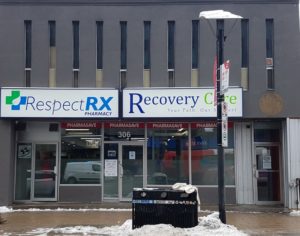Safer (drug) supply on Rideau Street
Larry Newman
“To get in, you have to pee dirty.”
What?
This is a quote from Jason, responding to my question about how to join the program dispensing safe opioids at the Respect Rx drugstore on Rideau Street next to the Petro Canada gas station. When a urine test reveals one of the street opioids like fentanyl or heroin, the opioid user is then eligible to receive a prescription for the corresponding safe drug, in Jason’s case methadone. As long as Jason pees clean he can remain in the program. I asked him if he pays for it; he replied, “No, the Province pays.” I suspect that he is enrolled in the Ontario Disability Support Program which pays for safe drugs. His addiction would qualify him for that program.
Jason is a guy that you might have seen outside the exit door of the Rideau Loblaws. This is one of his panhandling locations. I stop now and then to talk and sometimes give him some money. Now he gets his methadone prescription filled once a day and he says that interval works for him. One big advantage is that he knows that he is going to get it every day, reliably. Not like a street drug.
Drug overdoses in Ottawa have risen sharply this past year—again. One of the reasons is the uncertain strength of the drug purchased from the more-or-less underground market. Fentanyl is a very powerful opioid, and carfentanyl is an order of magnitude stronger. The uncertainty of provenance is another danger, adding to other drug-associated dangers.
Frustrated by the inability to control opioids available illegally, British Columbia has opted to supply prescription drugs to street users. This province recently invested in a program called Safe Supply which provides safe prescription opioids via vending machines. Users are allowed these drugs after passing a provincial examination; then they use a palm print to access the machines.
This is Ottawa: we aren’t there yet. But Health Canada has provided funds this past summer to start a similar program—without the vending machines. They are calling it Safer Supply and there are many contributors to the project. Donna Sarrazin, the Director of Pathways to Recovery, is the overall manager/coordinator of Safer Supply Ottawa, with funds from Health Canada. She has called on many of our community service organizations to help. They are:
- Pathways to Recovery — local project management and coordination
- Sandy Hill Community Health Centre — family- and community-based support services
- Somerset West Community Health Centre — family- and community-based support and some drug prescribing
- Ottawa Inner City Health — both prescribing and family- and community-based support
- Recovery Care — both prescribing as well as community- and family-based support
- Respect Rx — prescribing for recovering opioid users who come for tests and daily methadone treatments
So how does it all work? Historically, organizations like the community health centres and Inner City Health have seen and treated opioid drug users. The SHCHC OASIS program, for instance, has dealt with addicts for many years and has operated a supervised injection site (SIS) at Nelson and Rideau Streets for the last three. It is these organizations that have been in contact with drug users and have the knowledge and staff to recommend treatment as well as offer wraparound support.

Photo Larry Newman
Now these organizations can refer clients to Recovery Care or Respect Rx. Both are focused on ensuring that the opioids taken by users are safe. Although their programs are focused on the medical part of treating substance use disorder, they also offer mental health programs which are essential to every treatment plan.
This is one more effort to protect drug users from death by street drug. First came free, clean drug paraphernalia, then supervised injection sites were legalized, and now the substitution of prescription drugs for street drugs is allowed. Safer Supply looks to me like a textbook program: funded by the federal and provincial governments, but administered by the people who have experience working with drug users. This process gives the program a very good chance of being successful.
